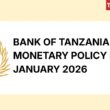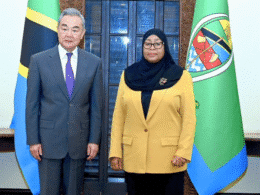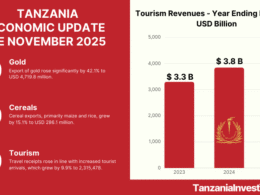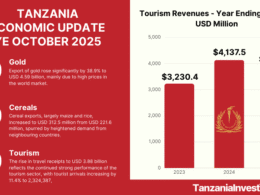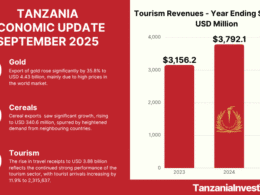TanzaniaInvest.com had the pleasure of interviewing Francisco Carlos Soares Luz, Ambassador of Brazil to Tanzania, Comoros and Seychelles.
TanzaniaInvest and Ambassador Soares discussec the current status of trade and cooperation between the two countries, the inflow of Brazilian investments to Tanzania and the future of the Tanzanian economy in view of the recent natural gas discoveries.
TanzaniaInvest: What is the current status of trade relations, investment and cooperation between Brazil and Tanzania?
Francisco Luz: Trade relations between Brazil and Tanzania are now way below its potential and highly concentrated on Brazilian exports to Tanzania, on average more than 99% of the trade flow.
{xtypo_quote_right}Trade relations between Brazil and Tanzania are now way below its potential and highly concentrated on Brazilian exports to Tanzania{/xtypo_quote_right}
After being consistently on the rise from 2000 to 2012, the year in which bilateral trade reached its peak at USD 67.1 million, commerce between Brazil and Tanzania fell dramatically the following year to USD 24.2 million.
From January to July 2014, total trade reached only USD 11.7 million, suggesting that bilateral trade will roll back to its 2008 levels.
Reasons for that are plenty: the absence of air and shipping links between our countries; Brazilian manufactured products facing tough competition from Asian countries; application of non-tariff barriers by the Tanzanian Government on products with which we are very competitive, such as poultry and beef; and a lack of aggressiveness from Tanzanian exporters in looking for business opportunities in the Brazilian market, which has just reached 202 million consumers.
Regarding investment, Petrobras was initially the sole Brazilian company operating in Tanzania, but now others have opened offices in Dar es Salaam, including Construtora Queiroz Galvao and Green Best Solutions, which are soon to be joined by Odebrecht International.
Cooperation is mostly provided in health and agriculture, with an emphasis on cotton development.
{xtypo_quote_left}Petrobras was initially the sole Brazilian company operating in Tanzania, but now others have opened offices in Dar es Salaam{/xtypo_quote_left} TI: In which sectors of Tanzania’s vibrant economy do you see the greatest opportunities for Brazilian companies entering this market?
F.L.: I believe three sectors present the biggest opportunities for Brazilian companies in Tanzania: energy, infrastructure and agribusiness.
Besides Petrobras, I think other Brazilian companies are more than ready to invest in Tanzania’s energy sector, particularly hydropower and biofuel, as well as in other renewable energy projects.
{xtypo_quote_right}three sectors present the biggest opportunities for Brazilian companies in Tanzania: energy, infrastructure and agribusiness{/xtypo_quote_right}
Big Brazilian construction companies have shown great interest in developing infrastructure projects in Tanzania, and I hope some of them will move forward in the near future.
Last but not least, agribusiness development in Tanzania opens enormous opportunities for Brazilian companies and investors.
Tanzania has large tracts of idle arable land. Common geological and weather conditions could make the Brazilian experience in this sector the most adequate for this country.
Our agricultural machinery is built to work in tropical settings, which are similar to the ones found in Tanzania.
{xtypo_quote_left}agribusiness development in Tanzania opens enormous opportunities for Brazilian companies and investors{/xtypo_quote_left}
If the right conditions are in place, I believe attracting Brazilian investors to the sector could be effective, especially for sugar, soybeans and rice.
TI: Tanzania’s Oil & Gas industry is still in its infancy, but the government’s expectations on its capacity to move the country to the middle income level are great. What do you think are the key issues to ensure the Oil & Gas industry properly develops, while also benefitting the Tanzanian population? How does Brazil, with its know-how in this field, intend to assist?
F.L.: The Tanzanian Government and population are right in expecting the Oil & Gas industry to help move the country to the middle income level.
The potential is there, but the country depends on foreign investment to fulfill this potential.
In this case, I think the investors only dream of one thing: a clear, stable regulatory framework for the sector. I believe this is of key importance to move ahead.
The international scenario of natural gas changed a lot after the off-shore discoveries of 2012 and the amount of resources needed to develop one single project is massive.
In this less favourable environment, the beginning of gas production off-shore is still ten years away.
Tanzania must seize this time to build local capacity, to train as many personnel as possible in gas related areas and to prepare local suppliers and service providers to work together with investors.
{xtypo_quote_right}the beginning of gas production off-shore is still ten years away. Tanzania must seize this time to build local capacity{/xtypo_quote_right}
The Brazilian Government is working with Petrobras to provide technical training.
A first group of 100 technicians from the Mtwara region were trained in VETA in areas such as welding, painting, mechanics and electricity related to the oil industry.
Besides, an initial group of 15 Tanzanians are receiving Portuguese language classes, enabling them to apply for Masters and PhD scholarships at the best Brazilian universities in geology, geophysics and mining and oil engineering.
 |
| Ambassador Soares Luz in conversation with Tanzania Prime Minister Mizengo Pinda |
TI: On a wider scale, how conducive is the Tanzanian business environment to foreign direct investment (FDI), in your opinion? Which are the key issues to be aware of?
F.L.: I believe the Tanzanian Government is doing a good job in improving the business environment to attract more FDI, but there is still a lot to be done to curb red tape and expedite decision-making related to investment projects.
{xtypo_quote_left}the Tanzanian Government is doing a good job in improving the business environment to attract more FDI, but there is still a lot to be done to curb red tape{/xtypo_quote_left}
Investors are here to supply the funds necessary for the country’s development and receive friendly treatment from institutions like the Tanzanian Investment Centre (TIC).
Unfortunately, sometimes Immigration and the Tanzania Revenue Authority (TRA) officers are not so friendly, showing a detrimental mistrust of foreign investors, which is not conducive to the improvement of the business environment.
TI: You are about to finalize your mandate as Brazilian Ambassador to Tanzania. You have also lived and travelled extensively throughout Africa. How would you explain what is going on in Tanzania? How would you like to see the bilateral relations between Brazil and Tanzania develop in the near future?
F.L.: I have been in Africa for more than 13 years now and I have witnessed the changing of the perception of Africa from the “lost continent” to one of growth and opportunity. Tanzania is one of the many examples of this turnaround.
The country is endowed with great natural resources, is politically stable and is geographically very well positioned, close to the big markets of the future in Asia.
{xtypo_quote_right}[Tanzania] is endowed with great natural resources, is politically stable and is geographically very well positioned, close to the big markets of the future in Asia{/xtypo_quote_right}
Land is available for livestock and agricultural development, and a growing population will make it one of the biggest markets in the continent.
Considering all these conditions, I believe the future for this country could not be anything but bright.
Therefore, I hope our bilateral relations increasingly reflect this potential and continue to develop in many areas, not only in trade and investment.



